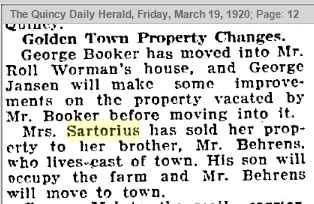 It can be frustrating when a document or record provides fewer identifying details of individuals than we would like, particularly in newspapers.
It can be frustrating when a document or record provides fewer identifying details of individuals than we would like, particularly in newspapers.
Sometimes it’s a matter of space and certain identifying details make the item too large to fit in the allotted space. Sometimes, particularly for death notices and obituaries, there may be a per-word charge that effects how many words can be used in an item.
But there is often another reason why extraneous details are not given in a newspaper story: they are not needed to identify the individual.
The illustration in this post, under the section “Golden Town Property Changes” indicated that “Mrs. Sartorius had sold her property to her brother, Mr. Behrens, who lives-east of town. His son will occupy the farm and Mr. Behrens will move to town.”
Why can’t it name Mrs. Sartorius?
Why can’t it name Mr. Behrens?
What can’t it name the oldest son?
Because it’s the small town of Golden, Illinois–there’s only one Mrs. Sartorius whose brother is Mr. Behrens. And given that, they’ll likely know who his oldest son is as well. Anyone contemporary reading the reference will likely know exactly to whom the article is referring even if first names are not used. The references as printed are sufficient to the 1920-era reader and using the first names would probably have made the item take up one more line of type-an additional concern.
Newspapers usually see themselves in the business of providing news. They don’t see themselves in the business of leaving behind a complete historical record for future generations. After all, who provided the newspaper its revenue in 1920? It’s subscribers and advertisers.
The Quincy Daily Herald in 1920 was not getting any money from those who currently use the newspaper today. They were under no obligation to leave behind a detailed record so that someone in 100 years would be able to learn things about their forebears.
Always keep in mind the original purpose of any record that we use.
And while you may miss the data when someone is simply listed as Miss Jones, remember that when the reference was published most people already knew who Miss Jones was.
The purpose of a newspaper is not to print things that everyone already knows. They are called newspapers for reason.

6 Responses
So very true! I’ve often wanted more, more, and more details, but the reality is as you say. In small towns, villages, especially during eras when folks were more likely to stay in the local community their entire lives, everyone knew everyone, details weren’t necessary. Sometimes, there were few families who weren’t related somehow to all the other families. A classmate had a difficult time finding anyone in town she could date because she was related to just about everyone. She still brings that up at class reunions.
I know how frustrating that can be as I have come across the very same thing. I am beginning to find the information that I need because of the advice u have given. Has given me food 4 thought. Then when I am looking 4 information I now know to check out the neighbors. I think I might find out more from them or find out they r related or at least something. It muddle through my head .
I have an additional hobby of local history, and it is so frustrating to me that although I know the names of many businesses and businessmen in our town, I can only with certainty state the location of a few of them. I particularly would like to know where in this town the GAR post was, because so many events took place there.
Also, my grandfather, who was an attorney and had been the prosecuting attorney for his large city, has a six line obituary. He must have been a wonderful man, but he didn’t leave a lot of money and his widow was already pinching pennies with the obituary.
How do you know it’s the oldest son?
That wasn’t supposed to be in there. Somehow it didn’t get taken out while I was editing. I’ve struck it out. Thanks for catching it.
In doing community history….be sure to “make friends” with the oldest local residents…the ones who have lived in town “all” of their lives. We held a “slide show” program about our town and had a very good turnout.
It wasn’t long before the “chair” who was leading the discussion lost “control” and the group took over…remembering when the grocery store was next to the furniture store…where Mrs. Pfingsten lived…when the train wreck happened…on and on and on! I was writing down the details as fast as I could, one partner was creating a map of stores and years “on the fly”, and the ‘chair’ was encouraging turn taking so that all could get their memories on the floor. Each new comment created a flood of new memories. What a great evening it was! And many still remember that we are interested and bring us stories that something reminded them of…and the information grows!